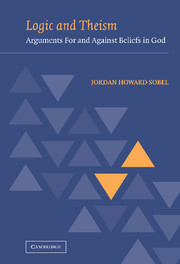Book contents
- Frontmatter
- Contents
- Preface
- DIVINITY
- ARGUMENTS FOR THE EXISTENCE OF GOD
- II Classical Ontological Arguments
- III Modern Modal Ontological Arguments
- IV Kurt Gödel's Ontologischer Beweis
- V First Causes “The Second Way”
- VI Ultimate Reasons: Proofs a contingentia mundi
- VII Look ’Round! – Arguments from Design
- VIII Clouds of Witnesses – “Of Miracles”
- ON TWO PARTS OF THE COMMON CONCEPTION
- ARGUMENTS AGAINST THE EXISTENCE OF GOD
- PRACTICAL ARGUMENTS FOR AND AGAINST THEISTIC BELIEFS
- Notes
- References
- Index of Names
III - Modern Modal Ontological Arguments
Published online by Cambridge University Press: 28 July 2009
- Frontmatter
- Contents
- Preface
- DIVINITY
- ARGUMENTS FOR THE EXISTENCE OF GOD
- II Classical Ontological Arguments
- III Modern Modal Ontological Arguments
- IV Kurt Gödel's Ontologischer Beweis
- V First Causes “The Second Way”
- VI Ultimate Reasons: Proofs a contingentia mundi
- VII Look ’Round! – Arguments from Design
- VIII Clouds of Witnesses – “Of Miracles”
- ON TWO PARTS OF THE COMMON CONCEPTION
- ARGUMENTS AGAINST THE EXISTENCE OF GOD
- PRACTICAL ARGUMENTS FOR AND AGAINST THEISTIC BELIEFS
- Notes
- References
- Index of Names
Summary
Classical arguments of Descartes, Leibniz, and Spinoza, the logics of which are implicitly of quantifiers and descriptions, definite and indefinite, and not modalities, are not valid. These able philosophers were, it seems, taken in by equivocalities of Latin forms corresponding to ambiguities and amphibolies in English of definite and indefinite articles. An argument of Charles Hartshorne, which improves on one of Norman Malcolm and which agrees with one of Alvin Plantinga, stays clear of those difficulties, and indeed of every strictly logical difficulty, as the first ontological argument did. It is essentially the ‘major part’ of that first argument in clarifying modern dress. The preliminary argument of Proslogion II is similarly transcribed by the modern company, as is Gaunilon's main objection to it, which benefits most of all from the modern modal framework in which the debate can now be conducted.
NORMAN MALCOLM'S ARGUMENT
Norman Malcolm says that Anselm maintained not only that existence contributes to greatness, and is in Descartes's terms a perfection, but also, in Proslogion III, that ‘necessary existence’ is a perfection:
Speaking of the being a greater than which cannot be conceived, he says: ‘And it so truly exists that it cannot be conceived not to exist. For it is possible to conceive of a being which cannot be conceived not to exist; and this is greater than one which can be conceived not to exist.’ (Malcolm 1960, p. 45)
Information
- Type
- Chapter
- Information
- Logic and TheismArguments for and against Beliefs in God, pp. 81 - 114Publisher: Cambridge University PressPrint publication year: 2003
